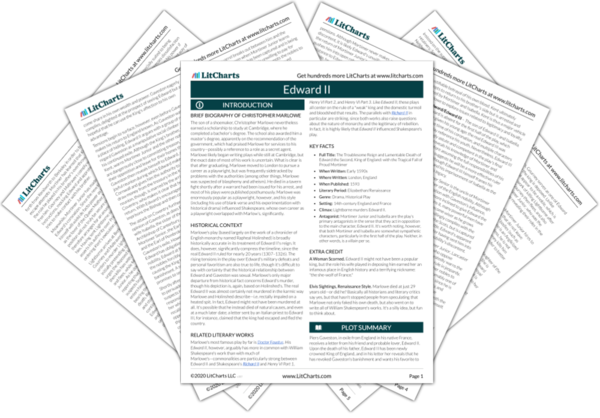One recurring image in Edward II is the “Wheel of Fortune”—a symbol medieval writers used to warn against the dangers of striving for worldly power and success. The basic idea was that the same fortune that carried a man to a position of prominence would ultimately bring about his downfall. Perhaps because of the clear parallel to the genre of tragedy (traditionally concerned with the fall of a powerful individual), the image frequently appears in Renaissance theater. Edward II, however, is remarkable for the sheer number of downfalls it depicts—not just the title character’s, but also Gaveston’s, Mortimer’s, and even secondary characters’. In the end, the play suggests that rank, morality, and individual agency matter very little in the face of an entirely impersonal fate.
This trend becomes particularly clear in the case of Mortimer Junior, who is perhaps the closest thing Edward II has to a tragic hero. In fact, the play is subtitled the “tragicall fall of proud Mortimer,” which also gives some insight into exactly where Mortimer’s failings lie. Mortimer is certainly “proud” once he assumes power, even to the point of hubris. He boasts, for instance, that no one and nothing can touch him, and claims to control fate itself. This arrogance, according to Mortimer himself, is what ultimately causes his downfall: there is a point on Fortune’s wheel, he says, “to which, when men aspire, / They tumble headlong down.” Given this, and given the implied courage of someone who dares to challenge destiny itself, Mortimer would seem to stand out as an exceptional (though fatally flawed) character.
Within the context of the play as a whole, however, Mortimer’s fall from grace is not unique at all. Instead, it is the last of a string of downfalls that overtake virtually every character who at any points holds a position of power: Gaveston, Edward himself, Isabella, and Spencer Junior. What’s more, even relatively minor (and, to Mortimer’s mind, ignoble) characters like Baldock cite the concept of Fortune’s wheel to explain their fate: “All live to die, and rise to fall.” This slew of characters rising and falling arguably dilutes the emotional impact of any single character’s defeat, and instead more generally emphasizes the idea that downfall and death (in Baldock’s words) are the shared experience of all humanity.
To some extent, then, the play’s depiction of fortune and tragedy mirrors what is (for the time it was written) a relatively democratic worldview. Mortimer bitterly resents the social climbing of characters like Gaveston and Spencer Junior because they are low-born, but his own ambition leads him to precisely the same fate: his rise and fall, in other words, are not more “noble” by virtue of his own social standing. On the other hand, it is hard not to see the play’s many downfalls as evidence of a dark and bleak worldview. Edward II’s characters seem trapped in an endlessly looping cycle of violence and death. In this world, individual action and morality hardly seem to matter, not simply in the sense that characters cannot ward off their fates, but also in the sense that no character can even attain the status of a full tragic hero: the audience's attention is split between a number of tragic figures (Gaveston, Mortimer, and Edward II) who ultimately share the same fate despite having very different failings as individuals. In this way, the play breaks the conventional association between a fatal flaw or mistake and a fall from grace. Although characters repeatedly claim that their successes—e.g. Edward's initial victory over the rebel nobles—stem from the virtuousness of their motives, these claims ring hollow: Mortimer and Isabella, for instance, seem very nearly as corrupt when they rise to power as they are when they fall from it. In other words, Marlowe depicts fortune as a largely arbitrary and impersonal force, rather than as one that punishes the bad and rewards the good.
Fortune and Tragedy ThemeTracker

Fortune and Tragedy Quotes in Edward II
Successful battles gives the God of kings
To them that fight in right and fear his wrath.
Since then successfully we have prevailed,
Thanks be heaven's great architect and you…
Sith the fates
Have made [Edward II] so infortunate,
Deal you, my lords, in this, my loving lords,
As to your wisdoms fittest seems in all.
But what is he, whom rule and empery
Have not in life or death made miserable?
Spencer, I see our souls are fleeted hence;
We are deprived the sunshine of our life.
Make for a new life, man; throw up thy eyes,
And heart and hand to heaven's immortal throne,
Pay nature's debt with cheerful countenance.
Reduce we all our lessons unto this:
To die, sweet Spencer, therefore live we all;
Spencer, all live to die, and rise to fall.
As thou intendest to rise by Mortimer,
Who now makes Fortune's wheel turn as he please,
Seek all the means thou canst to make him droop,
And neither give him kind word nor good look.
Base Fortune, now I see that in thy wheel
There is a point to which, when men aspire,
They tumble headlong down; that point I touched,
And seeing there was no place to mount up higher,
Why should I grieve at my declining fall?











